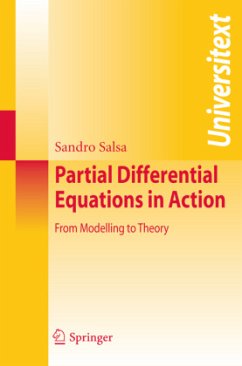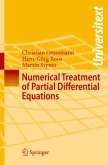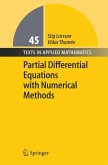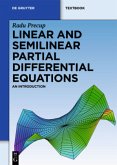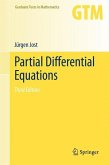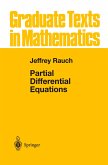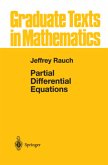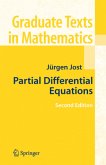The main purpose is on the one hand to train the students to appreciate the interplay between theory and modelling in problems arising in the applied sciences; on the other hand to give them a solid theoretical background for numerical methods, such as finite elements. Accordingly, this textbook is divided into two parts. The first one has a rather elementary character with the goal of developing and studying basic problems from the macro-areas of diffusion, propagation and transport, waves and vibrations. Ideas and connections with concrete aspects are emphasized whenever possible, in order to provide intuition and feeling for the subject. For this part, a knowledge of advanced calculus and ordinary differential equations is required. Also, the repeated use of the method of separation of variables assumes some basic results from the theory of Fourier series, which are summarized in an appendix.
The main topic of the second part is the development of Hilbert space methods for the variational formulation and analysis of linear boundary and initial-boundary value problemsemph{. }%. Given the abstract nature of these chapters, an effort has been made to provide intuition and motivation for the various concepts and results. The understanding of these topics requires some basic knowledge of Lebesgue measure and integration, summarized in another appendix.
At the end of each chapter, a number of exercises at different level of complexity is included. The most demanding problems are supplied with answers or hints. The exposition if flexible enough to allow substantial changes without compromising the comprehension and to facilitate a selection of topics for a one or two semester course.
The main topic of the second part is the development of Hilbert space methods for the variational formulation and analysis of linear boundary and initial-boundary value problemsemph{. }%. Given the abstract nature of these chapters, an effort has been made to provide intuition and motivation for the various concepts and results. The understanding of these topics requires some basic knowledge of Lebesgue measure and integration, summarized in another appendix.
At the end of each chapter, a number of exercises at different level of complexity is included. The most demanding problems are supplied with answers or hints. The exposition if flexible enough to allow substantial changes without compromising the comprehension and to facilitate a selection of topics for a one or two semester course.
From the reviews:
"This book reflects several years of the author's teaching experience ... on partial differential equations taught to students in applied mathematics, physics and engineering. ... The book is well-organized and is written in a lucid and rigorous manner. ... This highly recommended book is a good resource for a solid course on modern methods and applications of partial differential equations at the advanced undergraduate or introductory graduate level." (Yuri V. Rogovchenko, Zentralblatt MATH, Vol. 1146, 2008)
"This book reflects several years of the author's teaching experience ... on partial differential equations taught to students in applied mathematics, physics and engineering. ... The book is well-organized and is written in a lucid and rigorous manner. ... This highly recommended book is a good resource for a solid course on modern methods and applications of partial differential equations at the advanced undergraduate or introductory graduate level." (Yuri V. Rogovchenko, Zentralblatt MATH, Vol. 1146, 2008)

